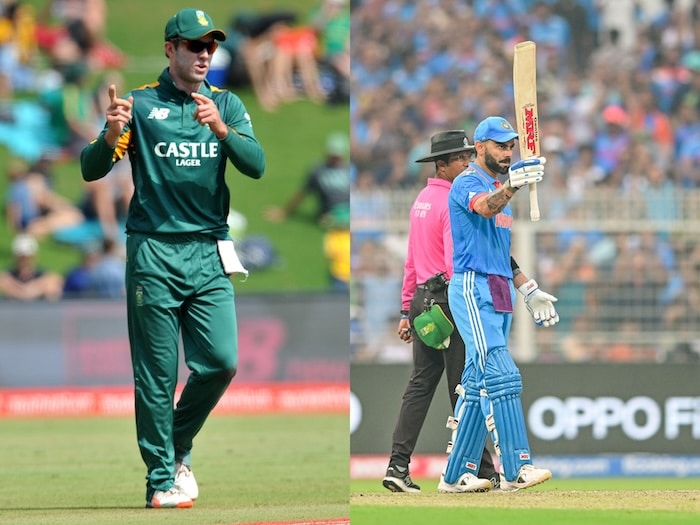India great Virat Kohli has hailed former teammate AB de Villiers as the “most talented cricketer” he has ever played with following the South Africans induction into the ICC Cricket Hall of Fame.
De Villiers, who concluded his career with almost 20,000 runs in the three international formats, is considered one of the first real three-format batting greats and joins England great Alastair Cook and Indian women’s pioneer Neetu David in the most recent class of inductees.
Like Kohli, a great in his own right, de Villiers stands alone as a pivotal player in cricket’s current growth, averaging over 50 in the two longer formats and hitting over 135 in the third, all while displaying athletic prowess in the field and with the gloves.
“You are thoroughly deserving of your place – after all, the Hall of Fame is a representation of your impact on the game, and yours has been truly unique,” Kohli said.
“People have always spoken about your ability, and rightly so. You are the most talented cricketer I have played with, the absolute number one.”
In addition to competing against de Villiers in a many of international series and tournaments, Kohli has unique knowledge of him because he shared a dressing room with the Royal Challengers Banglaore from 2011 to 2021.
The great of India praised the lessons he learnt from the Proteas icon and de Villiers’ self-belief in difficult situations when batting alongside in the Indian Premier League.
“You had a crazy amount of belief that you could execute whatever you wanted to on a cricket field, and you normally did. That is why you ended up being so special.”
“We were chasing 184 (for RCB in 2016) against an attack including Sunil Narine, Morne Morkel, Andre Russell and Shakib Al Hasan. You came in to join me with around 70 on the board and Narine was bowling.
“You played and missed a couple and told me during a timeout that you weren’t picking him too well. I felt I was, so I remember telling you to give me the strike and I would try and hit boundaries off him.
“In the first over Narine bowled after the timeout, I was ready at the non-striker’s end thinking you were definitely giving me a single. So, imagine my surprise when you back away to the leg side, Sunil follows you and you slog sweep him over square leg for a 94-metre six!
“If I have a lack of belief against someone, I’d just try and get off strike – but you hit him for a 94-metre six without picking the ball. That sums you up. You could just do things our minds were not ready to process, and then everyone thinks ‘how the hell did that happen?’”
Though his work in red-ball cricket was also recognised by being selected to the ICC Test Team of the Year four times and as the 12th player of the team in 2012, De Villiers’ white-ball exploits are well-documented, as evidenced by his multiple ICC Men’s ODI Player of the Year Awards and his record for the fastest-ever men’s ODI century.
In Test cricket, de Villiers was known for his determination, persevering through difficult times for his team yet having the ability to quicken his pace when necessary. De Villiers scored an undefeated 106* in a nearly five-hour stay during South Africa’s victorious chase of 414 against Australia in 2008. He also scored a 220-ball 33 to assist his team save an Adelaide Test match during the equivalent 2012 Tour.
To illustrate the South African’s focus and conviction to batten down the hatches when necessary, Kohli cited a similar de Villiers effort in Delhi in 2015.
“You were always completely in tune with the needs of the team, which made you one of the hardest players to make plans for when we were on opposing sides in international cricket,” Kohli recalled.
“Everyone remembers your attacking shots but you would adapt to the situation. Take 2015, in Delhi, when you faced 297 balls and made 43 trying to save the Test match.
“There must have been a temptation at some stage to think ‘I’ve faced 200 balls, I need to hit a boundary’. But once you locked yourself into what the situation required, you just kept going on and on.
“It all comes back to that belief in your ability. It wasn’t just about the crazy, extravagant shots. You had the ability to defend the ball and had belief in that defence. To play that way because South Africa needed you to do so is a classic example of the team player you were.
“A lot of players can have impressive numbers but very few have an impact on the psyche of those watching. For me, that is the highest value you can have as a cricketer and that is what makes you so special.”
Kohli continues by giving de Villiers credit for teaching him about the mental aspect of the game, particularly how to look forward to the future and avoid getting caught up in the past.
According to the India star, who is over five years de Villiers’ junior, Kohli’s success may be attributed to the South African’s mindset and desire to improve, since he has rarely experienced a period of poor form.
“Your drive to want to be the guy to win the game for your team was tremendous and something I learned a lot from,” Kohli noted.
“I remember taking from you that it doesn’t matter what you have done in the last four games, it is about how you approach the game today. It is about always being positive, always taking the game on and finding a way to get the job done.”
The only player to surpass de Villiers’ total when he retired from international cricket was fellow Hall of Fame inductee Jacques Kallis, who concluded as South Africa’s second-top run scorer across all international formats.
De Villiers is considered one of the most inventive and devastating hitters in the modern game because of his ability to score with a wide variety of shots against all kinds of bowlers. Kolhi believes that de Villiers’ skills and philosophy of the game serve as a benchmark for what can be accomplished in upcoming international cricket generations.
“A lot of players can have impressive numbers but very few have an impact on the psyche of those watching. For me, that is the highest value you can have as a cricketer and that is what makes you so special,” Kohli continued.
“You are in the Hall of Fame for the impact you have left on the game and I don’t think there is anything more special for a cricketer than to have that honour.
“You are one of the greatest players to ever play the game.”





